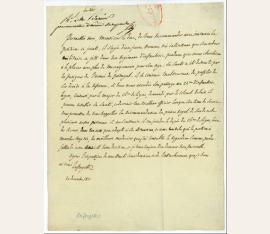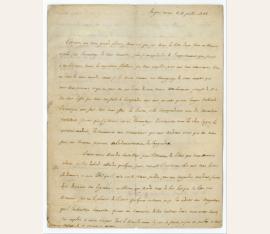französischer Militär und Staatsmann, Kämpfer im amerikanischen Unabhängigkeitskrieg (1757-1834). Autograph letter signed. O. O. [Lagrange?]. 20.12.1811. 1 S. 4to.
$ 1,930 / 1.800 €
(937092/BN937092)
Interceding on behalf of a young officer whose health has been ruined during the French campaigns in Portugal, asking that he be placed in a different regiment so as that he may there regain his strength: "Permettez moi, Monsieur le duc, de vous recommander avec instance la pétition ci jointe: il s'agit d'un jeune homme trés interessant que son ardeur militaire a jetté dans un regiment d'infanterie pendant que nous cherchions à le placer avec plus de ménagements pour son âge. Sa santé a été detruite par les fatigues de l'armée de Portugal [...] Si vous nous accordes son passage au 24ème d'infanterie legere, consenti par le major du 26ème de ligne, demandé par le colonel Belair, il pourra rebastir sa santé, a devenir un excellent officier lorsque son tems de service.
Vous permettra de vous rappeller la recommandation du prince royal de Suede et de plusieurs autres personnes. Si au contraire il va joindre le depoi du 26ème de ligne, loin des secours, dans un aire peu adapté à sa situation, et avec un zele qui le portera à marcher trop soi, les meilleurs medecins que j'ai consulté le regardent comme perdu [...]". Old red secretarial stamp at the head of the letter. - Lafayette, a close friend of George Washington, Alexander Hamilton, and Thomas Jefferson, was a key figure in the French Revolution of 1789 as well as of the July Revolution of 1830. He fought in the American Revolutionary War, holding senior positions in the Continental Army, and was one of the victorious commanders at the Siege of Yorktown. In 1789, with Jefferson's assistance, he co-wrote the French "Declaration of the Rights of Man", inspired by the U.S. Declaration of Independence..
French statesman and military officer (1757-1834), hero of the American Revolutionary War. Autograph letter signed. Sarreguemines (Saargemünd). 4to. 2 pp. on bifolium. With autograph address.
$ 6,968 / 6.500 €
(92277/BN61322)
To the French Reformed pastor Jean-Paul Rabaut Saint-Étienne, accepting an offer to begin a correspondence, discussing Lafayette's long-standing relations with American Protestant ministers and his hopes to improve trade with America, whose economy he believes will grow with the country. Commercial negotiations would be resumed after Lafayette's return from Germany, he writes, and the issue would be debated with great urgency by ministers and private individuals alike during the coming winter: "J'accepte de bien bon cœur l'offre que vous me faites de correspondre avec moi, et n'être qu'une longue habitude d'amerique m'a fait voir sans effroi la liaison, et la correspondance avec des ministres protestant, j'avisai que j'y trouve encore l'avantage d'annoncer vous les idées sages, les opinions modérées, la soumission aux circonstances qui vous rendront ainsi que M.
votre pere un Homme precieux à l'administration du Languedoc [...] à mon retour d'allemagne, je reprendrai mes négociations commerçantes, et j'ai fait avant de partir tout ce que la circomstance permettaient. il m'est impossible de ne pas esperer, qu'un peu d'un côté, et un peu de l'autre, nous en parvenions à obtenir une meilleure position de commerce vis à vis des Americains, qui puisse croitre en avantage avec le pais lui même, et ce doit être un objet pour les ministres et les particuliers dans le courant de l'hiver prochain [...]". - Celebrated as a hero of two worlds, Lafayette, himself a Catholic, had first sailed to America in 1777 to fight for the country's independence as well as his own ideals of the Enlightenment. There he had met such famous Protestants as George Washington and Benjamin Franklin. A few years later, Lafayette would take a leading part in the siege of Yorktown (1781); upon his return to France he was given a triumphant reception when Louis XVI admitted him to the Assembly of Notables. Two pastors of the Reformed Church, Paul Rabaut and his son Jean-Paul Rabaut Saint-Étienne, became Lafayette's Protestant contacts in France - a connection that would be instrumental in persuading Louis XVI to issue the edict of Versailles, granting religious tolerance especially for the Huguenots. After his role in the American Revolution, Lafayette was an important statesman in the early the French Revolution: on 11 July 1789 he presented to the French National Assembly the "Declaration of the Rights of Man and of the Citizen", which had been drafted in consultation with his close friend Thomas Jefferson, then a diplomat in Paris. - With traces of old mounting on the verso of the counterleaf. Lightly browned due to age..

